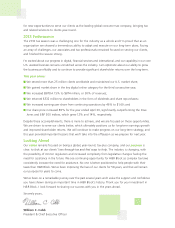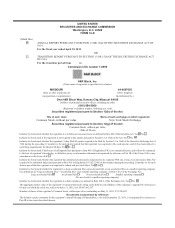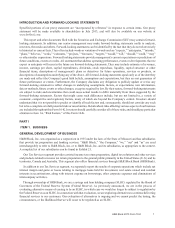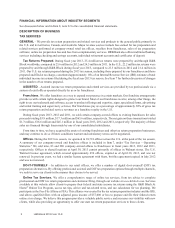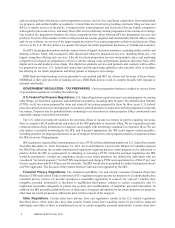HR Block 2013 Annual Report Download - page 12
Download and view the complete annual report
Please find page 12 of the 2013 HR Block annual report below. You can navigate through the pages in the report by either clicking on the pages listed below, or by using the keyword search tool below to find specific information within the annual report.H&R Block 2013 Form 10-K 5
regulations and requirements relating to offering income tax courses. These requirements include licensing, bonding
and certain restrictions on advertising.
Franchise Regulations. Many of the income tax return preparation offices operating in the U.S. under the name
“H&R Block” are operated by franchisees. Our franchising activities are subject to the rules and regulations of the
FTC, potential enforcement by the CFPB, and various state laws regulating the offer and sale of franchises. The FTC
and various state laws require us to furnish to prospective franchisees a franchise disclosure document containing certain
prescribed information. A number of states in which we are currently franchising regulate the sale of franchises and
require registration of the franchise disclosure document with certain state authorities. We are currently operating under
exemptions from registration in several of these states based on our net worth and experience. Substantive state laws
regulating the franchisor/franchisee relationship presently exist in a large number of states, and bills have been introduced
in Congress from time to time that would provide for federal regulation of the franchisor/franchisee relationship in
certain respects. The state laws often limit, among other things, the duration and scope of non-competition provisions,
the ability of a franchisor to terminate or refuse to renew a franchise and the ability of a franchisor to designate sources
of supply. From time to time, we may make appropriate amendments to our franchise disclosure document to comply
with our disclosure obligations under U.S. federal and state laws.
Foreign Regulations. We are also subject to a variety of other regulations in various foreign markets, including
anti-corruption laws and regulations. Foreign regulations and laws potentially affecting our business are evolving
rapidly. We rely on external counsel in the countries in which we do business to advise us regarding compliance with
applicable laws and regulations. As our international operations grow, we continue to develop and enhance our internal
legal and operational compliance programs that guide our businesses in complying with laws and regulations applicable
in the countries in which we do business.
REGULATION AND SUPERVISION – BANK AND HOLDING COMPANIES – Our indirect subsidiary, HRB
Bank, is a federal savings bank chartered under the Home Owner's Loan Act, as amended (HOLA). H&R Block, Inc.,
H&R Block Group, Inc. and Block Financial LLC (our Holding Companies) are SLHCs because they control HRB
Bank. The following is a general description of certain U.S. federal banking statutes and regulations that apply to HRB
Bank and our Holding Companies.
The Dodd-Frank Act. The Dodd-Frank Wall Street Reform and Consumer Protection Act (the Dodd-Frank Act)
was signed into law on July 21, 2010. This federal statute made extensive changes to the laws regulating federal savings
banks, their holding companies and other financial services companies. The Dodd-Frank Act requires various federal
agencies to adopt many new implementing rules and regulations. The federal agencies are given significant discretion
in drafting the new rules and regulations; consequently, many of the details and much of the impact of the Dodd-Frank
Act will not be known for several years.
The Dodd-Frank Act substantially restructured the regulation of federal savings associations and savings and loan
holding companies. The Office of Thrift Supervision (OTS), which previously was the primary federal regulator for
both HRB Bank and our Holding Companies, was eliminated. On July 21, 2011, the OTS transferred its regulatory
authority to the Office of the Comptroller of the Currency (OCC) and the Federal Reserve. On that date, the OCC, the
primary federal regulator for national banks, became the primary federal regulator for federal savings banks, including
HRB Bank, and the Federal Reserve became the primary federal regulator for all SLHCs and their nonbank subsidiaries,
including our Holding Companies and their nonbank subsidiaries.
The Dodd-Frank Act further limited the activities of SLHCs and their nonbank subsidiaries. The OTS had authorized
SLHCs and their nonbank subsidiaries to engage in the broadest range of financial activities that could be engaged in
by a bank holding company that has elected to be a financial holding company (FHC). Pursuant to the Dodd-Frank
Act, the Federal Reserve has issued a regulation that SLHCs, and their nonbank subsidiaries, may only engage in such
financial activities if the SLHCs qualify for and elect to become FHCs. Our Holding Companies have not elected to
become FHCs and have no plans to do so.
The Dodd-Frank Act also weakened the federal preemption rules that have been applicable for national banks, federal
savings banks and their subsidiaries, and gives state attorneys general the ability to enforce consumer protection laws.
Prior to the enactment of the Dodd-Frank Act, OTS regulations provided that the HOLA, and the OTS regulations that
interpret the HOLA, preempted the entire field of state regulation in the critical areas of lending and deposit-taking,
resulting in federal preemption of most state consumer protection laws in those areas. The Dodd-Frank Act, effective




